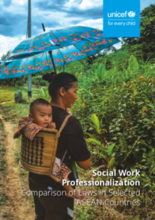Over the last decade, the Government of Malaysia has achieved much progress towards strengthening the social service workforce, as evidenced by the National Competency Standards for Social Work Practice (2010), the creation of the Malaysian Social Work Profession Council, the Mapping of the Social Service Workforce in Child Protection (2022) and the drafting of the Social Work Profession Bill. The Government also signalled its commitment to implementing a holistic and comprehensive approach to social service workforce strengthening by signing the Ha Noi Declaration on Strengthening Social Work towards a Cohesive and Responsive ASEAN Community, and the accompanying Roadmap (ASEAN Roadmap for the implementation of the Ha Noi Declaration).
Drafting the Social Work Profession Bill is a milestone towards formally recognizing and regulating social work as a profession. Although efforts to advance the Social Work Profession Bill have been ongoing since 2010, it has not yet been tabled in Parliament. This legislation is crucial for establishing professional standards, ensuring proper training, and safeguarding public safety. It seeks to enhance social services, particularly for vulnerable groups, and will provide legal recognition and support for social workers, thereby improving their capacity to deliver high-quality services.
This paper provides a comparative analysis of social work professionalization in the Philippines, Thailand, Indonesia and Singapore. By examining the different approaches across the countries, policymakers will have examples of practices that have been effective elsewhere and adopt these to suit the context of Malaysia.

